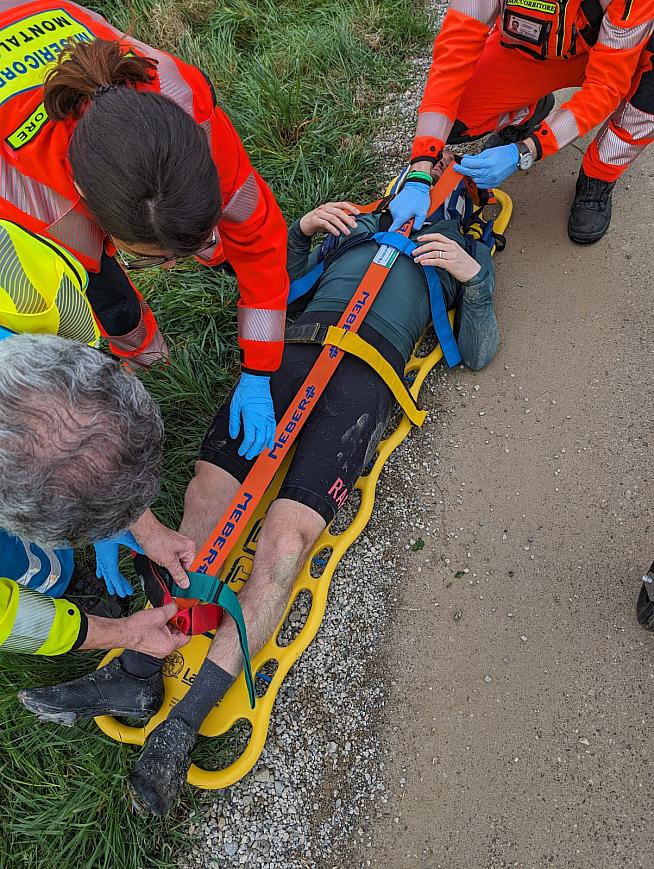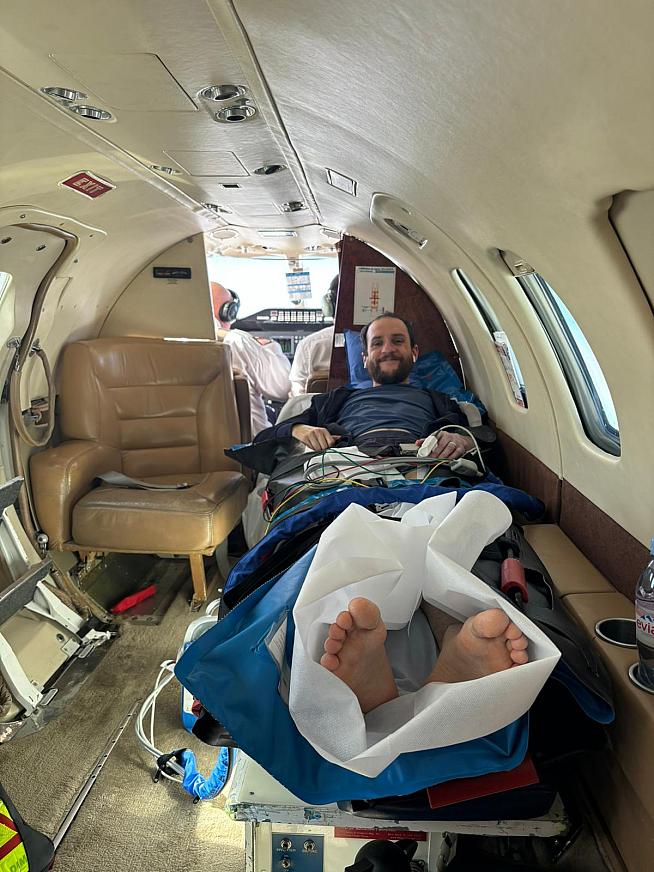It didn't hurt quite as much as you'd imagine a broken leg would.
I was riding along quite happily, enjoying the beautiful scenery on the Gran Fondo Strade Bianche.
I'd had a good ride and was about 60km in on one of the longest sections of gravel when I hit a pothole. I remember thinking "That's pretty deep, I should avoid that" but I'd seen it too late. My front wheel hit the hole and I got chucked off the front of my bike and landed on my right-hand side with a thud.
I tried to get up because I was in the middle of the road, but I had absolutely nothing in my leg and collapsed. My brother, who I had caught up a few km previously, dragged me off the road into the grass verge.
It was lucky that I was with my brother, for a couple of reasons:
- He can speak Italian
- No one else was stopping
Without him I'd have been stuck in the middle of that road until someone did stop and help me.

My brother called the ambulance, and they got me on a stretcher and took me to the hospital. I could feel every bump in that road, but honestly, I did not think it was broken. I could wiggle my toes, although my right leg did seem a bit shorter that the other one.
Either way, the hospital did an X-ray and confirmed that I'd broken the top of my right femur in three places (I think. More on that later).
They gave me some options: have surgery in Italy, or arrange to get home through my insurers and have surgery at home. They did not recommend the latter, because it was what they kept calling a "complex break".
Speaking to my wife (who was furious/worried about me) on the phone, we decided I should have surgery in Italy and then get back home as quickly as possible.
So, I crashed on the Sunday and then surgery was planned for the Tuesday. All seemed to go well after getting dosed up on some strong drugs.
After the operation, they told me I needed to stay in bed for 25 days - no crutches, no wheelchair, nothing, just bed. I could sit up a bit but couldn't get out of bed.
I did have physio, but it was lying down.

It took me just over two weeks to get back to London, mainly because the doctors wouldn't discharge me unless I was lying down. No commercial airline would take me, so I had to get a special medical repatriation flight back.
After getting back to London I was straight into a hospital where they did some X-rays and told me it was a complex break, but the surgeons had done a good job. They talked about the break, but I blanked out the details. My thinking was that ignorance is bliss.
They almost immediately got me out of bed and on crutches. I was back home in two days.
Tips for cycling abroad: How to deal with a worst-case scenario
I've done quite a few European gran fondos and never really thought about what would happen if I did hurt myself. As you can imagine that sentence went down badly with my wife.
What did I learn, and how can you make sure that, if the worst does happen, you get home quick?
1. Don't fly solo
My first piece of advice would be, don't ride on your own. I've no idea who would have got my bike, no idea who would have been able to get all my stuff from the Air B&B or even checked out from it if my brother hadn't been there.
Every year large numbers of UK cyclists travel to European events like the Tour of Flanders, L'Etape du Tour and the Mallorca 312. Many do it through tour operators who take care of accommodation and logistics - and in the unlikely but possible event of injury, they will be able to offer some degree of support too.
2. Be insured
Get some good cycling specific insurance. My travel insurance covered me getting home but I had to prove I wasn't in a professional race, and it took a lot of time to confirm that.
Keep on and on to your insurers to make sure your case is progressing. You'll need to do the same with the doctors.
3. Have a plan
You don't need to anticipate every doomy scenario that might unfold - that doesn't help - but it's worth giving some thought to an emergency plan in case of injury on a ride.
Much like you'd carry a pump and spare tube in case of puncture, having even a loose idea of what you'll do should the worst happen could make life a lot easier.
4. Do the physio
Stretch. When you get your stretches from the physios, do them as much as you can.
It's not fun, but the more diligent you are with your physio the faster you'll be back on the bike.
Getting back on the bike
Anyway, I'm now on the road to recovery. I'm back on the stationary bike, I'm doing physio every week. I've signed up to a very small sportive - 50 miles, no climbing - in mid-summer as a target to motivate me.
And to answer the question that everyone has asked: yeah, the bike was fine. Not even a puncture.
0 Comments





